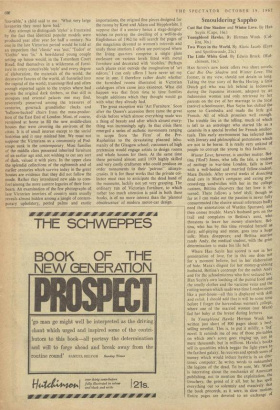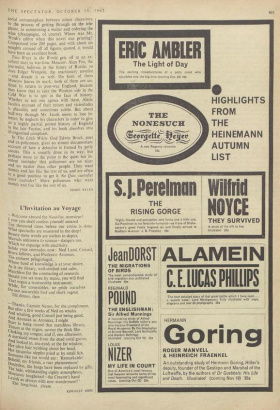Smouldering Sappho
HAN SUYIN'S new book offers two short novels, Cast But One Shadow and Winter Love. The former, in my view, should not detain us long. Taking the true story of Bertha Hertog, a little Dutch girl who was left behind in Indonesia during the Japanese invasion, adopted by an Indonesian woman and only retrieved by her parents on the eve of her marriage to the local (native) schoolmaster, Han Suyin has shifted the scene to Cambodia and made the little girl French. All of which promises well enough. The trouble lies in the telling, much of which is left to an astrologer who started life as a catamite in a special brothel for French intellec- tuals. This early environment has infected him with literary and philosophical pretensions which are not to be borne. It is really very unkind of people to corrupt the young in this fashion.
Winter Love, however, is another matter. Bet- tina ('Red') Jones, who tells the tale, a student of zoology in war-time London, falls in love with a well-heeled and married fellow-student, Mara Daniels. After several weeks of dissecting dead cats in Mara's company and eating pro- cessed-egg sandwiches with her in the college canteen, Bettina discovers that her love is re- turned. There follows a brief idyll, though as far as I can make out the passion is never fully consummated (the elusive sexual references badly need the annotations of Warden Sparrow), and then comes trouble. Mara's husband gets on the trail and complains to Bettina's aunt, who threatens to leave her money elsewhere. Bet- tina, who has by this time revealed herself as dirty, self-pitying and mean, goes into a huge sulk: Mara disappears; and Bettina marries randy Andy, the medical student, with the grim determination to make his life hell.
Where Han Suyin has scored is not in her presentation of love, for in this one does not for a moment believe, but in her elaboration of hate. Mara's disgust for her money-grubbing husband, Bettina's contempt for the oafish Andy and for the schoolmistress who first seduced her, Han Suyin's own loathing of the putrid food and the smelly clothes and the varicose veins and the rutting women which made war-time London seem like a pest-house—all this is displayed with skill and relish. I should add that it will be some time before I forget the horrendous women's college, where one of the married women (not Mara) fed her baby at the breast during lectures.
In Youngblood Hawke Herman Wouk has written just short of 800 pages about a best;
selling novelist. This is, to put it mildly, a 'big novel. It reminds me of one of those pin-tables on which one's score goes ringing up, not in mere thousands, but in millions. Hawke's books sell in quantities which beggar the light-years to the farthest galaxy; he receives and spends sums of
money which would induce hysteria in an elec-
tronic computer; he writes words to outnumber the legions of the dead. To be sure, Mr. Wouk is interesting about the mechanics of American publishing, not to mention the exploitation. the treachery, the greed of it all, but he has spelt everything out so solemnly and massively that the book proceeds, as it were, in slow motion. Entire pages are devoted to an exchange of social commonplace between minor characters, to the process of getting through on the tele- phone, to summoning a waiter and ordering the Wine (champagne, of course). Where was Mr. Wouk's editor when this novel was printing? Compressed into 200 pages, and with about six noughts crossed off all figures quoted, it would have been an excellent book.
Two Ways in the World gets off to an ex- cellent start in war-time Moscow. Alun Fox, the journalist, believes in the future of Russia; so does Edgar Wimpole, the reactionary novelist —and dreads it as well. On both of them Moscow leaves its mark; both of them are un- fitted to return to post-war England, because they know that to take the Western side in the Cold War is to spit in the face of history. Whether or not one agrees with them, Alaric Jacob's account of their return and vicissitudes is plausible and sometimes subtle. But about half-way through Mr. Jacob seems to lose in- terest; he neglects his characters in order to give us " a highly partial potted history of England in the late Forties, and his book dissolves into ill-organised complaint. In The Little White God Edwin Brock, poet and ex-policeman, gives an almost documentary account of hOw a detective is framed by petty crooks. This is smartly done in its way; but Perhaps more to the point is the quiet but in- sistent reminder that policemen are no nicer and no nastier than other people. They want Money and fun like the rest of us, and are often 1.11 a good position to get it. So Quis custodiet 1PSO8 custodes? More policemen who want money and fun like the rest of us.
SIMON RAVEN















































 Previous page
Previous page